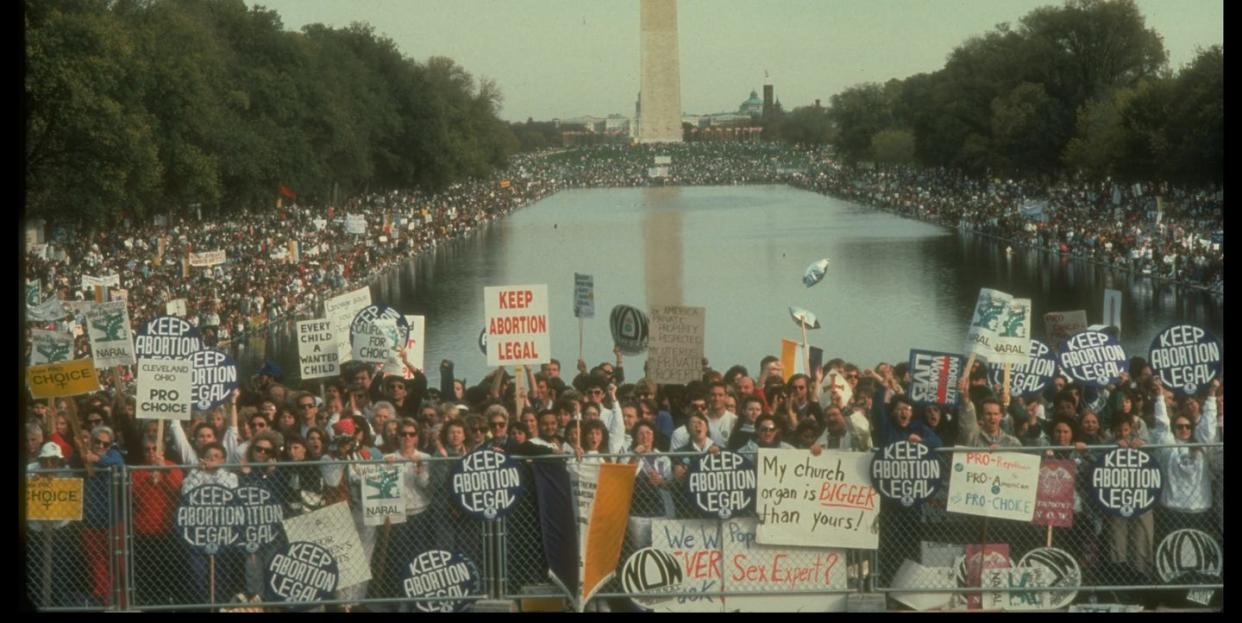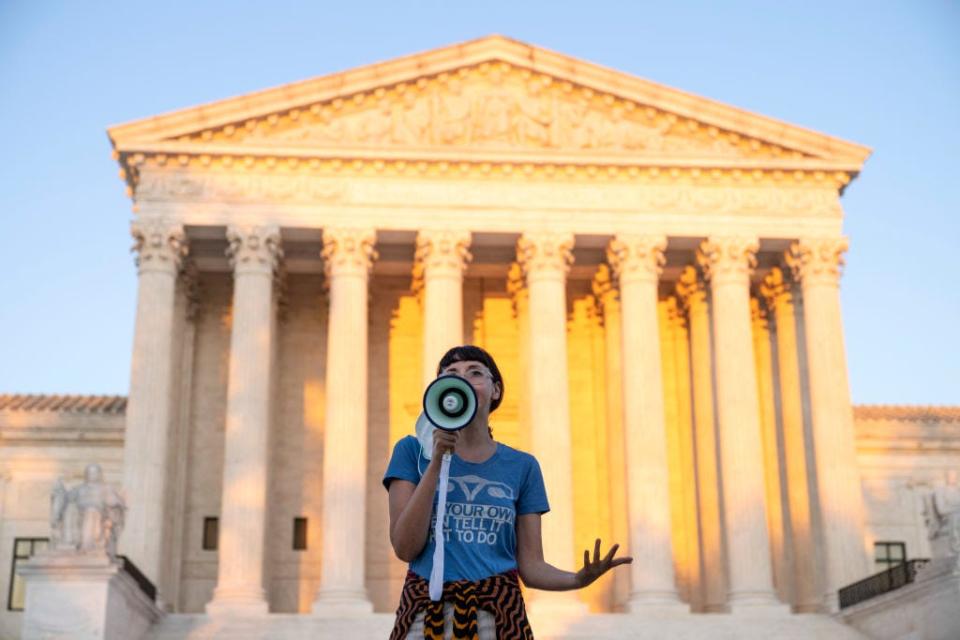What Does Overturning Roe v. Wade Mean for Your State? Here's What to Know

- Oops!Something went wrong.Please try again later.
"Hearst Magazines and Yahoo may earn commission or revenue on some items through the links below."
News broke Monday night that the Supreme Court will likely overturn Roe v. Wade, a landmark court case that makes abortion legal across the country.
The ruling has not yet been overturned and abortion is still legal across the U.S. However, a draft opinion from the Supreme Court, obtained by Politico, suggests that the court plans to overturn the case. The draft opinion, which was written by conservative Justice Samuel Alito and reflects the majority opinion of the court, was written in reference to a case called Dobbs v. Jackson Women’s Health Organization, which deals with Mississippi's 15-week abortion ban.
But this current case is really, at its core, challenging the initial Roe v. Wade decision made 49 years ago. It's important to note that this draft opinion is not final until a formal opinion is released, and justices can still change their minds, per CNN.
It feels like everyone is talking about Roe v. Wade right now, and it’s understandable to have questions about what overturning the case could mean for the country and for people's access to abortions. So, here’s everything you need to know.
What is Roe v. Wade and why does it matter?
Roe v. Wade is a landmark Supreme Court case from 1973 that determined that the U.S. Constitution protects a woman’s right to an abortion before her fetus is viable, per Cornell Law School.
The case started with a woman named Norma McCorvey, who took on the legal pseudonym "Jane Roe." McCorvey became pregnant in 1969 with her third child and wanted an abortion. But she lived in Texas, where abortions were illegal except in rare circumstances.
The court ultimately decided that during the first trimester, the decision to terminate a pregnancy was a woman’s choice on the basis that it constituted a woman's "right to privacy." And as such, it was unconstitutional to ban women's access to abortion in individual states.
With this decision from the Supreme Court, states could still “regulate,” but not outlaw abortions in the interest of the mother’s health. Beyond the first trimester, the court ruled that states could regulate or outlaw abortions except when necessary to preserve the life or health of the mother.
If Roe v. Wade is overturned in the coming months, the Supreme Court would put the decision back into the states' hands. Each state would have to decide for itself if abortion is legal or not within its borders. More on that in a second.

Why might Roe v. Wade be overturned?
Roe v. Wade has been repeatedly challenged for nearly a half-century, but the current conservative makeup of the Supreme Court has made it more likely that the case could actually be overturned this year.
Last year, the Supreme Court agreed to hear a challenge to Mississippi’s 15-week abortion ban (Dobbs v. Jackson Women’s Health Organization), which also required the court to re-analyze the decision in Roe v. Wade, CNN explains. That decision will ultimately have an impact on the legality of abortion in the U.S. and will leave it up to states to decide if and when abortions should be legal.
"The challenge to Mississippi's law gave the Court an opportunity to reverse Roe," says Mary Ziegler, a professor of law at Florida State University, and author of Abortion and the Law in America: Roe v. Wade to the Present. "There would be any number of other options to reverse Roe. This was just the one that came to the Court the most quickly."
At the same time, some states have put policies in place that will increase abortion access for constituents, while others have made things more restrictive.
Overall, 26 states, or more than half of the country, have laws that could restrict access to abortion if Roe is overturned. And just 16 plus the District of Columbia have laws in place to protect that right, even if Roe no longer exists.
If Roe v. Wade is overturned, "we would expect about half of the states to criminalize all abortions. That will happen very quickly—in a matter of weeks or months," Ziegler says.
Which states will ban abortion or have abortion trigger laws in place?
Thirteen states have passed so-called “trigger laws” that will almost immediately ban abortion if Roe v. Wade is overturned in the coming months, according to the Guttmacher Institute and CNN. Those states include:
Arkansas
Idaho
Kentucky
Louisiana
Mississippi
Missouri
North Dakota
Oklahoma
South Dakota
Tennessee
Texas
Utah
Wyoming
At least 9 states have pre-Roe abortion bans that currently go unenforced because they are "unconstitutional"
That means these states already had restrictions in place, but Roe v. Wade rendered them unconstitutional, the Guttmacher Institute explains. These restrictions are currently blocked by courts but could be brought back under a court order if Roe v. Wade is overturned.
Alabama
Arizona
Arkansas
Michigan
Mississippi
Oklahoma
Texas
West Virginia
Wisconsin
16 states and D.C. would be mostly unaffected
Sixteen states have put their own laws in place to protect the right to end a pregnancy, and some lawmakers from these states have also vowed to protect abortion rights.
"Our daughters, sisters, mothers, and grandmothers will not be silenced. The world is about to hear their fury," California Governor Gavin Newsom said on Twitter. "California will not sit back. We are going to fight like hell."
The states that will be mostly unaffected include:
California
Colorado
Connecticut
Delaware
District of Columbia
Hawaii
Illinois
Maine
Maryland
Massachusetts
Nevada
New Jersey
New York
Oregon
Rhode Island
Vermont
Washington
How would people access abortions in these states if a ban goes into effect?
If a woman wants to obtain an abortion and lives in a state where they’re illegal, she will still have options. But they will be harder and more expensive.
Some options include traveling to a state where abortions are legal or ordering pills from outside the country, says Stephanie Toti, senior counsel and project director at The Lawyering Project. "Folks who have the resources to travel will be forced to travel out of state at great expense and inconvenience," she says. "But people who don't have the option to travel will be forced to carry pregnancies to term."

Ordering medication online is tricky, Toti says. "Those services exist and will continue to exist but, in any state that bans abortion, those services will also be illegal," she says. "Folks trying to access abortion in that way will face potential criminal prosecution."
Clinics in states neighboring other states with abortion bans will also likely see greater demand and limited capacity to meet the needs of those seeking help, according to The New York Times.
"In the short term, each state will decide its own policies," Ziegler says. "But there will be a push to criminalize abortion nationwide through the Supreme Court or through Congress."
When is a final decision on Roe v. Wade happening?
There’s no set date for a final decision, but it’s expected some time in June or July of 2022.
You Might Also Like

